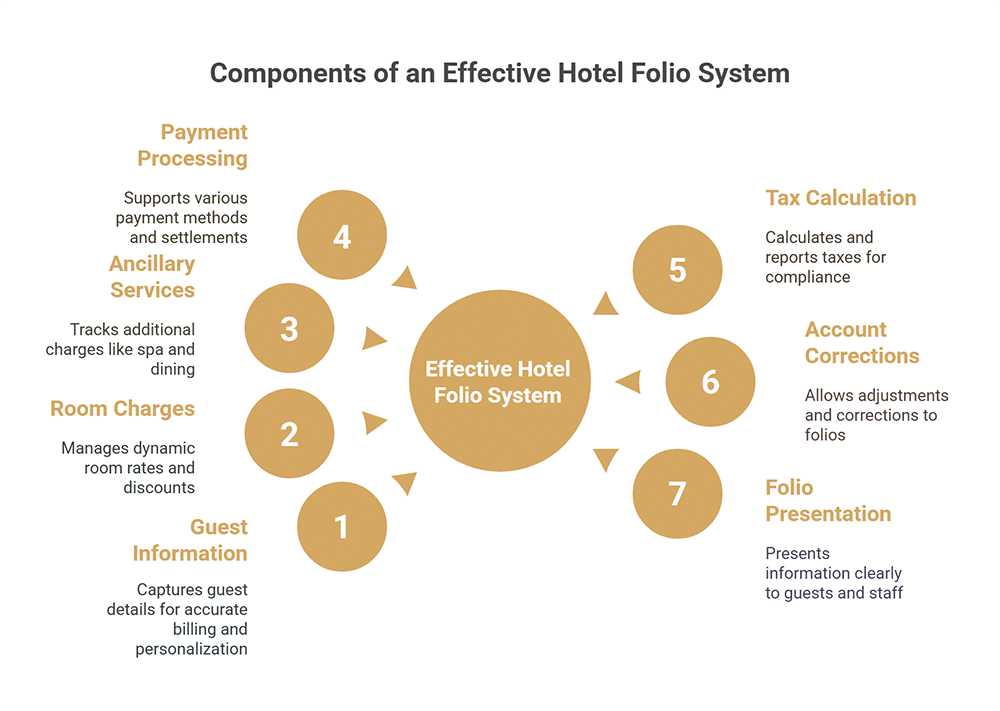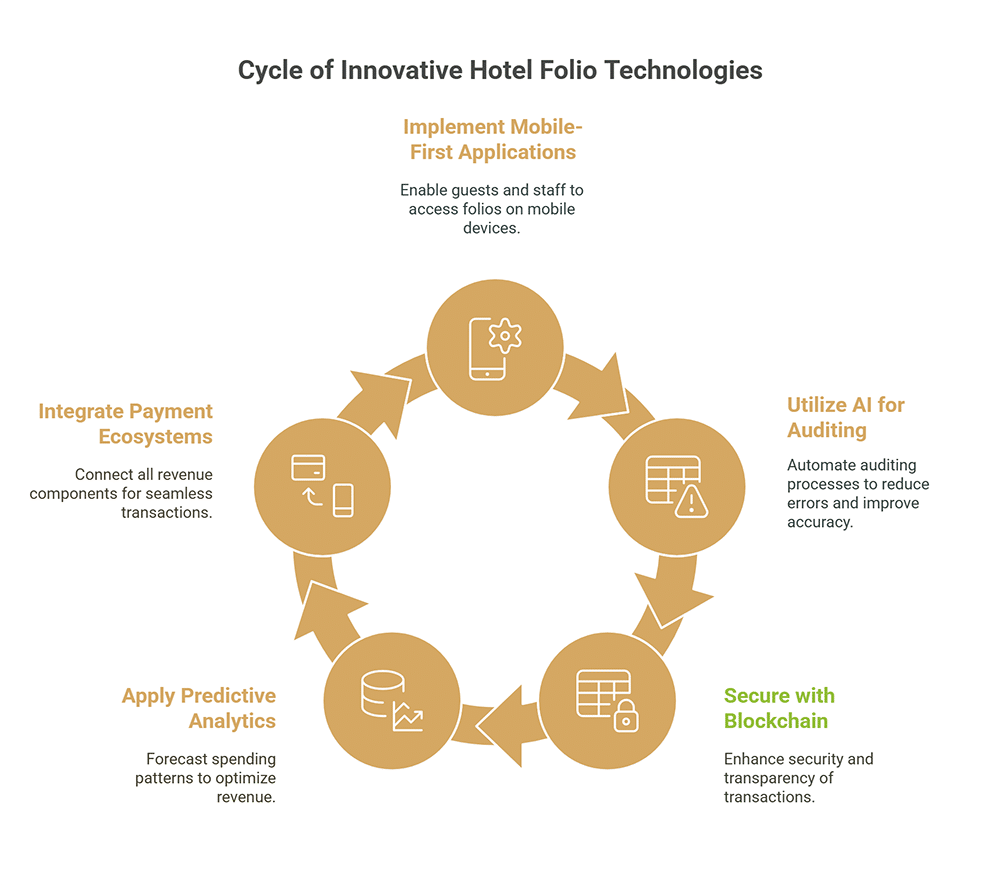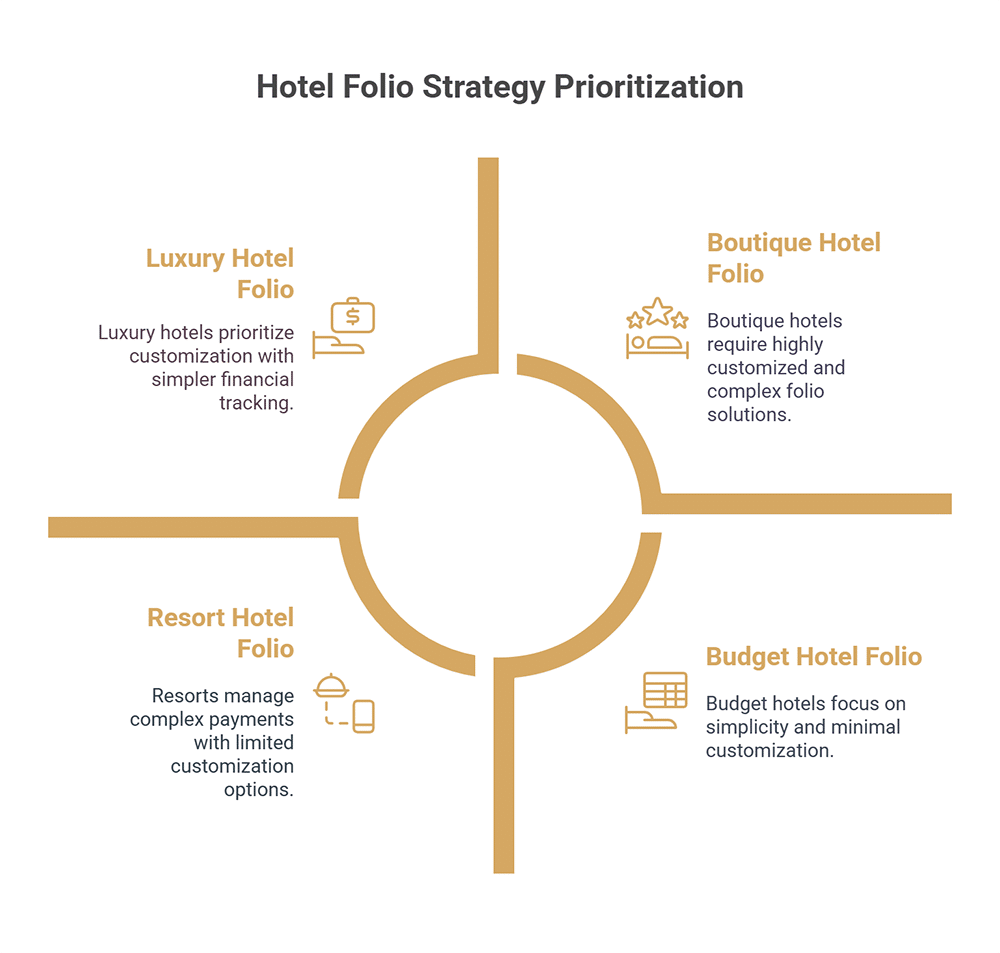A hotel folio is a detailed financial document, breaking down the charges a guest has incurred during a stay. These itemized documents are now typically created and stored digitally, allowing for real-time changes.
Hotel folios play an important role in providing transparency to guests and delivering accurate billing. Accuracy and transparency are key to a positive guest experience and the integrity of your hotel finances.
In this article, you can learn about the main components of a hotel folio, the technology that is transforming the way hotel folios are managed and some useful strategies for different types of hotels.
Table of Contents:
- Understanding a Hotel Folio: The Foundation of Guest Financial Management
- Why Hotel Folio Management Matters: A Key Element of Hospitality Success
- 7 Essential Components of an Effective Hotel Folio System
- 5 Innovative Hotel Folio Technologies Transforming Guest Financial Management
- 5 Hotel Folio Strategies for Different Property Types
- Key Best Practices for Effective Hotel Folio Management
- Common Hotel Folio Pitfalls and Prevention Strategies
- Hotel Bill Format: Creating Clear and Professional Guest Folios
- Understanding Hotel Fees: Maximizing Revenue and Guest Satisfaction
Understanding a Hotel Folio: The Foundation of Guest Financial Management
A hotel folio is an ongoing record of the charges a guest has incurred during their stay. It will include elements like the price of the room, charges from ancillary services, taxes and any adjustments made, such as discounts.
Charges will be listed in an itemized format, with every individual charge, as well as a total. Most folios in the modern hotel industry are stored and managed digitally and can be updated in real-time.
Essentially, a folio can be viewed as a master document for hotel charges. At the end of a guest’s stay in a hotel, the folio can be used to calculate the total amount they owe and to produce the final bill.
Why Hotel Folio Management Matters: A Key Element of Hospitality Success
Hotel folios are important documents, providing guests with a transparent list of charges they have incurred over their stay. A hotel folio can also be used by the hotel to understand the popularity of individual services.
Effective management of hotel folios matters because the final bill presented to guests needs to be accurate. By managing the folio carefully, in real-time, you can provide completely transparent, up-to-date information.
Ultimately, how well you manage each hotel folio can have a direct impact on the accuracy of your financial documents. Accuracy is also critical for maintaining high levels of guest satisfaction and avoiding disputes and complaints. Over the longer term, accurate financial records can help with securing hotel financing.
7 Essential Components of an Effective Hotel Folio System
A high-quality hotel folio system is a crucial part of your wider hotel financing and accounting strategy. In the following sections, you can explore some of the most vital components that make up an effective system.
Video: How to work on guest folio – Part 1
1. Guest Information and Identification
Your hotel folio system needs to capture guest details, so the right guest receives the right final bill. This information capture should include the guest’s name, contact details and the booking reference.
Having a robust system for guest identification is essential for avoiding errors that could negatively impact the guest experience. It can also help to prevent fraud, resolve any disputes that arise and help with personalization.
Your hotel folio system can also be integrated with wider hotel systems, so you must connect the right guest to the right charges. Collecting guest information can also help with your customer loyalty program.
2. Room Charges and Room Rate Management
At the very heart of each hotel folio is the room rate. However, this can be a dynamic calculation, which may need to factor in discounts, upgrades, special offers, extended stays and changes to the room rate during the stay.
Accuracy in dynamically calculating room charges will help to avoid discrepancies between what a guest expects to pay and what they are charged. It also allows you to charge an accurate amount if there is an early departure.
The best folio systems can contend with complex situations, like partial-day charges, sudden decisions to extend a stay and other unexpected situations that could result in additional charges or discount being applied.
3. Ancillary Services and Incidental Charges
Within the hotel industry, there are many ancillary services and incidental charges. This can include spa services, room service, restaurant and bar bills, hotel minibar purchases, internet charges and more.
It is vital for any hotel owner or manager to invest in a system that can track all of these charges. By capturing this data, you can also identify trends in spending patterns and the popularity of specific services.
Tracking additional charges beyond the room rate can be complex because some payments may be made at the point of sale, while others are added to the final bill. It is important to have a system that automates this.
4. Payment Processing and Settlement
Your hotel folio system needs to include payment processing and settlement features. This can include support for a variety of payment methods, as well as deductions from the final bill, such as deposits and discounts.
Having a hotel folio system that can contend with payment issues is critical for maintaining cash flow. It can also be valuable to helping you to maintain compliance with hotel industry regulations.
Payment processing is not always straightforward and there may be a need to cater for third-party payments and corporate billing. Your system should also balance payment flexibility with limiting risk to your hotel.
5. Tax Calculation and Reporting
Guests may be subject to a variety of taxes, which need to be added to the hotel folio. You might also need to use this information when you generate tax reports or provide performance reports to stakeholders or the hotel owner.
Tax calculations and reporting are essential for compliance, while reporting can help a hotel owner or manager to make evidence-based strategic decisions. At the same time, it can provide clarity for hotel guests.
Again, your hotel folio system may need to deal with complex situations, like guests who are exempt from tax. The quality of your reporting can also affect everything from securing hotel financing to compliance penalties.
6. Account Corrections and Adjustments
Your hotel folio system should provide the tools necessary to track changes and make adjustments. As a result, you can correct any errors that may occur and present an accurate final bill.
Adjustments or corrections may need to be made for many reasons and it is important that changes can be made easily. A trackable system also helps you to understand changes and revert changes that may have been made maliciously.
The best systems widely deployed in the hotel industry include features like requiring approval for changes over a certain threshold to prevent tampering. They will also log who made changes and when.
7. Guest Folio Presentation and Communication
Finally, your hotel folio system needs to include robust and varied ways of presenting the information to guests and hotel staff. The folio can be viewed on paper, via email, on an app, or via a web browser.
Presenting hotel folio information clearly can reduce complaints or disputes and can make it easy for everyone to understand the final bill. Presentation can also impact how guests view their stay and your service standards.
High-quality hotel folio systems can provide tools to personalize documents, so they relate to individual guests. The best solutions will offer real-time online visibility, so guests understand charges as they occur.
5 Innovative Hotel Folio Technologies Transforming Guest Financial Management
Like with other systems that are widely deployed in the hotel industry, your hotel folio system is influenced by emerging technology. Here, you can explore the innovations that are having a transformative impact.
Video: Folio transfer , Hotel Management System
1. Mobile-First Hotel Folio Applications
Mobile-first hotel folio applications can be accessed on a variety of devices, including smartphones and tablets. This not only allows staff to access data more easily, it also enables guests to view the information too.
The prevalence of mobile devices has made mobile-first design an important part of modern digital design. Mobile devices can offer real-time access to information from anywhere in the world.
With a mobile-first hotel folio system, you can potentially help guests to view, manage and settle their bill from their phone. This can deliver self-service solutions that could help reduce checkout times.
2. AI-Powered Hotel Folio Auditing Systems
Artificial intelligence can be used within hotel folio auditing systems, analyzing data and identifying trends and discrepancies. It can potentially reduce errors, improving guest satisfaction levels.
Improvements to AI technology have helped to automate many of the processes associated with folio management in the hotel industry. This can potentially improve accuracy and ease the workloads of your employees.
AI can identify suspicious patterns associated with fraud, which could save your hotel money. Automation can be especially valuable for improving the night audit process, which is historically reliant on a single person.
3. Blockchain-Based Hotel Folio Security
Blockchain technology can be used to record transactions using a decentralized, public ledger, which cannot be tampered with. The result is excellent transparency, security and permanency.
For hotel owners and managers, blockchain can be used to secure hotel folio systems, making them more robust. As blockchain records cannot be retroactively altered, blockchain systems can increase trust.
As businesses become more familiar with blockchain technology and its benefits, it will continue to transform hotel folio management. In particular, blockchain can potentially increase the dependability of your record keeping.
4. Predictive Analytics for Hotel Folio Optimization
Predictive analytics is increasingly used in the hotel industry to forecast spending patterns. This can factor in data like local events in the area, weather patterns, and historical seasonal fluctuations.
Within the field of hotel folio management, predictive analytics can help to anticipate financial results and predict revenue. It can also help to identify opportunities for upselling and strategic price adjustments.
As an example, your hotel folio system may use predictive analytics to predict that guests who book a certain room type typically use the hotel restaurant. The guest can then be targeted with relevant marketing, while financial planning for your hotel can factor in the likelihood of earning that revenue.
5. Integrated Payment Ecosystems for Seamless Folio Management
Integrated payment ecosystems can ensure that all revenue generating components of your hotel connect to the hotel folio system. This can allow payments to be made in the moment, or payments to be added to the final bill.
Within the hotel industry, integrated payment systems can create a more cohesive and unified experience for guests. At the same time, it can remove the barriers that have traditionally existed between different hotel departments.
Effectively, this means that any guest spending, regardless of whether it is related to spa services, the hotel restaurant or room service, will connect seamlessly to the relevant hotel folio for that guest. Leading systems also connect hotel folios to mobile wallets, cryptocurrency wallets and other payment methods.
5 Hotel Folio Strategies for Different Property Types
It is also important to acknowledge that there are different property types in the hotel industry. These different hotel types may need to have differing approaches to implementing a hotel folio strategy. In the following sections, you can learn about some of the specific strategies that may be associated with certain hotel types:
1. Luxury Hotel Folio Implementation
Within the luxury sector, hotel folio systems generally use comprehensive but discreet financial tracking, which helps to improve personalization. Strategies here need to prioritize accuracy and minimal friction.
Folio systems in luxury hotels must consider complex payment needs. For instance, some guests may have a corporate entity footing the bill and VIP guests may not handle their own payments directly either.
Guests in the luxury sector typically expect visibility and the ability to view the charges they have incurred before receiving the final bill. Often, luxury hotels eliminate traditional POS transactions, with individual payments instead being added to the folio so that everything can be paid for at check out time.
2. Resort and All-Inclusive Hotel Folio Management
Within resorts and all-inclusive hotels, a hotel folio strategy needs to factor in complex payment realities. This means activities need to be tracked carefully, with real-time updating of the folio.
For instance, an all-inclusive booking may cover many of the additional charges that guests would typically incur. However, there could still be extra charges for food and services not covered under the all-inclusive policy.
Resorts may also offer a combination of traditional and all-inclusive models, requiring a robust hotel folio system that can contend with this. Many of these properties will use visual or color-coded systems, making it easier to quickly identify charges that are included in the room rate, as well as additional charges.
3. Budget and Limited-Service Hotel Folio Systems
Within the budget and limited-service hotel sectors, hotel folio systems still need to be efficient, transparent and reliable. However, implementation is often more streamlined, reflecting the more simplistic nature of guest stays.
Streamlining of hotel folio strategies in the budget sector is important for minimizing staff workloads and keeping costs under control. At the same time, guests enjoying simple stays do not want to be bombarded with information.
Common approaches include automated email folio delivery and mobile-based payment systems, which can potentially bypass the in-person check out experience for maximum convenience.
4. Extended-Stay and Apartment-Style Hotel Folio Configuration
Extended-stay hotels and apartment-style offerings face the challenge of dealing with much longer billing cycles. This may include charging people multiple times, over several weeks or even months.
Hotel folio systems in these properties also need to contend with very complex billing cycles. For example, they may include charges related to the use of utilities and cleaning services.
Many of these properties use systems that facilitate automated recurring billing, so guests pay every week or every month. The billing cycles are also customizable, because guests may use certain services one week or month, but not the next. Often, guests can access real-time information about charges, making it easier to prepare for payments.
5. Boutique and Independent Hotel Folio Solutions
Boutique hotels are unique hotels, which often have unusual services on offer. This means the hotel folio systems they use need to be customizable, to capture charges that may not be common in other hotels.
Having this level of customization is important because guests still need visibility and transparency. Boutique hotels also still need to deliver accurate billing to optimize financial outcomes.
Boutique hotels must ensure the itemized lists they present guests with are easy to understand, so all services should be clearly labeled. Some boutique hotels place a strong emphasis on environmental issues and in these cases, it may also be necessary to track not only guest charges, but also guests’ carbon footprints for carbon offsetting.
Key Best Practices for Effective Hotel Folio Management
Below, you can view a breakdown of proven strategies that can help you to manage your hotel folio strategy effectively and deliver a positive billing experience for your guests:
- Daily Auditing: Systematically verify folios during the night audit. Make sure charges issued to guests match with your departmental reports and take steps to address any discrepancies quickly.
- Staff Training: Deliver comprehensive training so your employees understand hotel folio systems and procedures. Place a particular focus on how to communicate with guests and how to resolve disputes.
- Pre-Authorization: Implement robust and consistent pre-authorization protocols. Try to strike the right balance between guest convenience and protecting your hotel against fraud.
- Guest Communication: Ensure guests are able to access their folio during their stay, with real-time updates, when possible. Communicate clearly and transparently to keep any surprises and disputes to a minimum.
- Integration Verification: Integrate your hotel folio with your property management system and POS systems. Regularly test these connections to ensure data is being shared accurately and consistently.
- Documentation Standards: Document any adjustments made to room rates or guest charges. Create a system where notes are added to special arrangements or unusual transactions within your hotel folio system.
Common Hotel Folio Pitfalls and Prevention Strategies
Hotel folio management is complex and there are some common pitfalls that any hotel owner or manager needs to be aware of. Here, you will find a quick overview of some of the common errors and some prevention strategies:
- Room Rate Discrepancies: Use an automated rate verification system, which compares the rate agreed on booking with the rate charged. Only add charges to the folio once they have been verified.
- Duplicate Charges: Set up your property management system to automatically flag possible duplicates before adding them to the folio, identifying these based on shared timing and transaction amounts.
- Missing Charges: Make sure all hotel departments are carrying out reconciliation processes at the end of each shift. This helps to ensure any overlooked charges are added to the guest folio.
- Errors With Taxes: Create a hotel folio system that automatically applies taxes for different services. Ensure the system is set up to exclude guests who are exempt from taxes.
- Allocation Mistakes: Provide robust training for staff, ensuring they routinely verify room numbers and guest names at the point of contact, before adding charges to the folio.
- Settlement Problems: Create a process for verifying payment methods as early as possible during a guest stay. Alert guests early on if there are potential problems, so they have time to act.
Hotel Bill Format: Creating Clear and Professional Guest Folios
Your hotel bill format also plays a crucial role in optimizing your hotel folio strategy and maintaining high levels of guest satisfaction. The best formats are clear, easy to interpret and can be modified, when necessary. This can also help to prevent unnecessary misunderstandings and payment disputes.
In the “Hotel Bill Format: Essential Guidelines for Professional Hospitality Invoicing” you can explore the key elements of a great bill format and explore some of the innovations and technology solutions that can help.
Understanding Hotel Fees: Maximizing Revenue and Guest Satisfaction
Your hotel folio is an itemized list of hotel fees and charges. Examples can include amenity fees, parking charges, taxes, room service fees, charges for hotel minibar items, internet access fees and more. When these charges are broken down and clearly expressed, your guests are more likely to leave satisfied.
In the “Hotel Fees: A Comprehensive Guide to Understanding Accommodation Charges” article, you can learn more about how hotel fees work, the different types of fees that exist and why clarity and transparency matters.
Did You Like This Article about Hotel Folio?
You might also be interested in the following articles:
- Different Types of Hotel Guests and Tips on How to Appeal to Them
- Hotel Budget Plan: Practical Budgeting Tips for Hoteliers
- Hotel Costs: A Complete Guide to Customer Costs and Fees
- Pricing Strategies to Increase Your Hotel Revenue
- Revenue Management; clearly explained!
A hotel folio is a financial document that breaks down itemized guest charges. By investing in a robust folio system and providing quality training, you can reduce disputes, increase transparency and enhance the guest experience. At the same time, you can gain valuable insights around hotel performance and service popularity.
More Tips to Grow Your Business
Revfine.com is the leading knowledge platform for the hospitality and travel industry. Professionals use our insights, strategies, and actionable tips to get inspired, optimize revenue, innovate processes, and improve customer experience.Explore expert advice on management, marketing, revenue management, operations, software, and technology in our dedicated Hotel, Hospitality, and Travel & Tourism categories.











Leave A Comment